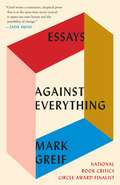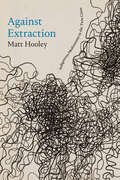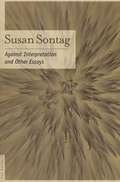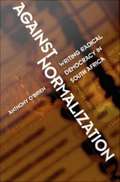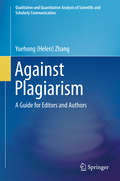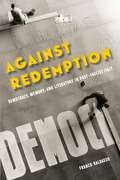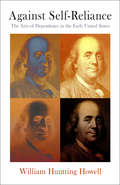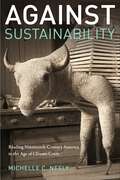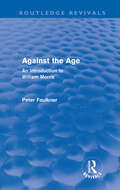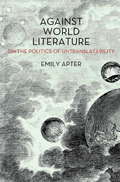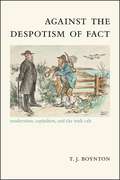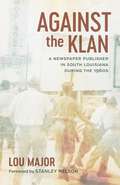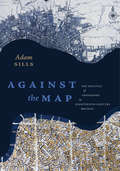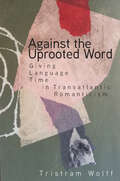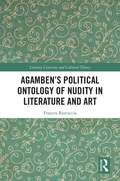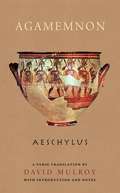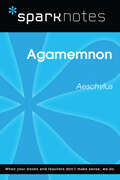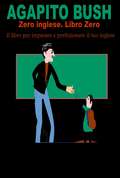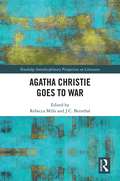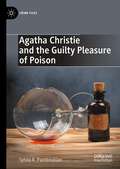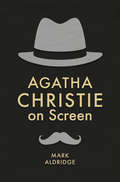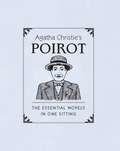- Table View
- List View
Against Everything: Essays
by Mark GreifA brilliant collection of critical essays by a young writer who is already a star in the intellectual firmament. As William Deresiewicz has written in Harper's Magazine, "[Mark Greif] is an intellectual, full stop...There is much of [Lionel] Trilling in Greif...Much also of Susan Sontag...What he shares with both, and with the line they represent, is precisely a sense of intellect--of thought, of mind--as a conscious actor in the world." Over the past eleven years, Greif has been publishing superb, and in some cases already famous, essays in n+1, the high-profile little magazine that he co-founded. These essays address such key topics in the cultural, political, and intellectual life of our time as the tyranny of exercise, the tyranny of nutrition and food snobbery, the sexualization of childhood (and everything else), the philosophical meaning of Radiohead, the rise and fall of the hipster, the impact of the Occupy Wall Street movement, and the crisis of policing. Four of the selections address, directly and unironically, the meaning of life--what might be the right philosophical stance to adopt toward one's self and the world. Each essay in Against Everything is learned, original, highly entertaining, and, from start to finish, dead serious. They are the work of a young intellectual who, with his peers, is reinventing and reinvigorating what intellectuals can be and say and do. Mark Greif manages to reincarnate and revivify the thought and spirit of the greatest of American dissenters, Henry David Thoreau, for our time and historical situation.From the Hardcover edition.
Against Extraction: Indigenous Modernism in the Twin Cities
by Matt HooleyIn Against Extraction Matt Hooley traces a modern tradition of Ojibwe invention in Minneapolis and St. Paul from the mid-nineteenth century to the present as that tradition emerges in response to the cultural legacies of US colonialism. Hooley shows how Indigenous literary and visual art modernisms challenge the strictures of everyday life and question the ecological, political, and cultural fantasies that make multivalent US colonialism seem inevitable. Hooley analyzes literature and art by Louise Erdrich, William Whipple Warren, David Treuer, George Morrison, and Gerald Vizenor in relation to histories of Indigenous dispossession and occupation, enslavement and Black life, and environmental harm and care. He shows that historical narratives of these cities are intimately bound up with the violence of colonial systems of extraction and that concepts like Indigeneity and sovereignty extend beyond treaty-granted promises of political control. These works, created in opposition and proximity to the extraction of cultural, political, and territorial resources, demonstrate how Indigenous claims to life and land matter to rethinking and unmaking the social and ecological devastations of the colonial world.
Against Interpretation and Other Essays
by Susan SontagFirst published in 1966, this celebrated book--Sontag's first collection of essays--quickly became a modern classic, and has had an enormous influence in America and abroad on thinking about the arts and contemporary culture.
Against Normalization: Writing Radical Democracy in South Africa
by Anthony O'BrienAt the end of apartheid, under pressure from local and transnational capital and the hegemony of Western-style parliamentary democracy, South Africans felt called upon to normalize their conceptions of economics, politics, and culture in line with these Western models. In Against Normalization, however, Anthony O'Brien examines recent South African literature and theoretical debate which take a different line, resisting this neocolonial outcome, and investigating the role of culture in the formation of a more radically democratic society. O'Brien brings together an unusual array of contemporary South African writing: cultural theory and debate, worker poetry, black and white feminist writing, Black Consciousness drama, the letters of exiled writers, and postapartheid fiction and film. Paying subtle attention to well-known figures like Nadine Gordimer, Bessie Head, and Njabulo Ndebele, but also foregrounding less-studied writers like Ingrid de Kok, Nise Malange, Maishe Maponya, and the Zimbabwean Dambudzo Marechera, he reveals in their work the construction of a political aesthetic more radically democratic than the current normalization of nationalism, ballot-box democracy, and liberal humanism in culture could imagine. Juxtaposing his readings of these writers with the theoretical traditions of postcolonial thinkers about race, gender, and nation like Paul Gilroy, bell hooks, and Gayatri Spivak, and with others such as Samuel Beckett and Vaclav Havel, O'Brien adopts a uniquely comparatist and internationalist approach to understanding South African writing and its relationship to the cultural settlement after apartheid. With its appeal to specialists in South African fiction, poetry, history, and politics, to other Africanists, and to those in the fields of colonial, postcolonial, race, and gender studies, Against Normalization will make a significant intervention in the debates about cultural production in the postcolonial areas of global capitalism.
Against Plagiarism: A Guide for Editors and Authors (Qualitative and Quantitative Analysis of Scientific and Scholarly Communication)
by Yuehong H. Helen ZhangThis is the first volume of a book series dedicated to "Qualitative and Quantitative Analysis of Scientific and Scholarly Communication". Fighting plagiarism is a the top priority for STM publishing. A practical guide will importantly contribute to the awareness of the relevant communities, bringing to the surface the basic rules and examples from the literature.
Against Redemption: Democracy, Memory, and Literature in Post-Fascist Italy (World War II: The Global, Human, and Ethical Dimension)
by Franco BaldassoWINNER, HELEN AND HOWARD R. MARRARO PRIZE IN ITALIAN HISTORYDiscloses the richness of ideas and sheds light on the controversy that characterized the transition from fascism to democracy, examining authors, works and memories that were subsequently silenced by Cold War politics.How a shared memory of Fascism and its cultural heritage took shape is still today the most disputed question of modern Italy, crossing the boundaries between academic and public discourse. Against Redemption concentrates on the historical period in which disagreement was at its highest: the transition between the downfall of Mussolini in July 1943 and the victory of the Christian Democrats over the Left in the 1948 general elections. By dispelling the silence around the range of opinion in the years before the ideological struggle fossilized into Cold War oppositions, this book points to early postwar literary practices as the main vehicle for intellectual dissent, shedding new light on the role of cultural policies in institutionalizing collective memory. During Italy’s transition to democracy, competing narratives over the recent traumatic past emerged and crystallized, depicting the country’s break with Mussolini’s regime as a political and personal redemption from its politics of exclusion and unrestrained use of violence. Conversely, outstanding authors such as Elsa Morante, Carlo Levi, Alberto Moravia, and Curzio Malaparte, in close dialogue with remarkable but now-neglected figures, stressed the cultural continuity between the new democracy and Fascism, igniting heated debates from opposite political standpoints. Their works addressed questions such as the working through of national defeat, Italian responsibility in World War II, and the Holocaust, revealing how the social, racial, and gender biases that characterized Fascism survived after its demise and haunted the newborn democracy.
Against Self-Reliance
by William Huntting HowellIndividualism is arguably the most vital tenet of American national identity: American cultural heroes tend to be mavericks and nonconformists, and independence is the fulcrum of the American origin story. But in the late eighteenth and early nineteenth centuries, a number of American artists, writers, and educational philosophers cast imitation and emulation as central to the linked projects of imagining the self and consolidating the nation. Tracing continuities between literature, material culture, and pedagogical theory, William Huntting Howell uncovers an America that celebrated the virtues of humility, contingency, and connection to a complex whole over ambition and distinction. Against Self-Reliance revalues and rethinks what it meant to be repetitive, derivative or pointedly generic in the early republic and beyond. Howell draws on such varied sources as Benjamin Franklin's programs for moral reform, Phillis Wheatley's devotional poetry, David Rittenhouse's coins and astronomical machines, Benjamin Rush's psychological and political theory, Susanna Rowson's schoolbooks, and the novels of Charles Brockden Brown and Herman Melville to tease out patterns of dependence in early America. With its incisive critique of America's storied heroic individualism, Against Self-Reliance argues that the arts of dependence were—and are—critical to the project of American independence.
Against Sustainability: Reading Nineteenth-Century America in the Age of Climate Crisis
by Michelle NeelyAgainst Sustainability responds to the twenty-first-century environmental crisis by unearthing the nineteenth-century U.S. literary, cultural, and scientific contexts that gave rise to sustainability, recycling, and preservation. Through novel pairings of antebellum and contemporary writers including Walt Whitman and Lucille Clifton, George Catlin and Louise Erdrich, and Herman Melville and A. S. Byatt, the book demonstrates that some of our most vaunted strategies to address ecological crisis in fact perpetuate environmental degradation.Yet Michelle C. Neely also reveals that the nineteenth century offers useful and generative environmentalisms, if only we know where and how to find them. Henry David Thoreau and Emily Dickinson experimented with models of joyful, anti-consumerist frugality. Hannah Crafts and Harriet Wilson devised forms of radical pet-keeping that model more just ways of living with others. Ultimately, the book explores forms of utopianism that might more reliably guide mainstream environmental culture toward transformative forms of ecological and social justice. Through new readings of familiar texts, Against Sustainability demonstrates how nineteenth-century U.S. literature can help us rethink our environmental paradigms in order to imagine more just and environmentally sound futures.
Against The Age: An Introduction to William Morris (Routledge Revivals)
by Peter FaulknerStudents new to the work of William Morris will find the full range of his achievements covered in this reissue of Peter Faulkner's excellent biography, first published in 1980. The author has carefully placed Morris in the context of the Victorian age, but has also suggested the relevance of his ideas today. The six chapters are organised biographically and cover all aspects of Morris’s work in poetry, fiction, design and socialist politics. The emphasis is on his continuous struggle against the age in which he lived, seen as an idealism which went through various stages from the wistfulness of The Earthly Paradise through the practical activities of the firm of Morris & Company to the socialism of Morris's later years. The book quotes freely from writings by Morris which are not easily accessible and gives an overall account from which the student can develop his specialist interests. This reissue will appeal to sixth-formers and undergraduates interested in the Victorian period, as seen through one of its most striking personalities. When this book appeared in 1980, Morris’s reputation had risen again after the low estimates of the interwar period. This was due both to the reappraisal of his politics and to the expanding popularity of his designs. Against the Age offers a clear account of Morris’s career for those developing an interest in his numerous achievements. It covers the whole range of Morris’s work, and argues for his significance as a writer of both poetry and prose. Since 1980 our knowledge of Morris has been enriched by the publication of Norman Kelvin’s edition of his Collected Letters, by the late Nicholas Salmond’s editions of his contributions to the socialist journals, by Fiona MacCarthy’s biography of 1984, and by the increasing recognition of Morris as a pioneer of environmentalism. However, the book retains its value for its wide coverage and its balanced attitude to Morris’s achievements, and for its encouragement to readers to consider the issues that make Morris of continuing importance today.
Against World Literature
by Emily ApterAgainst World Literature: On the Politics of Untranslatability argues for a rethinking of comparative literature focusing on the problems that emerge when large-scale paradigms of literary studies ignore the politics of the "Untranslatable"--the realm of those words that are continually retranslated, mistranslated, transferred from language to language, or especially resistant to substitution.In the place of "World Literature"--a dominant paradigm in the humanities, one grounded in market-driven notions of readability and universal appeal--Apter proposes a plurality of "world literatures" oriented around philosophical concepts and geopolitical pressure points. The history and theory of the language that constructs World Literature is critically examined with a special focus on Weltliteratur, literary world systems, narrative ecosystems, language borders and checkpoints, theologies of translation, and planetary devolution in a book set to revolutionize the discipline of comparative literature.
Against the Despotism of Fact: Modernism, Capitalism, and the Irish Celt (SUNY series, Studies in the Long Nineteenth Century)
by T. J. BoyntonEmerging at a moment of escalating colonial conflict between England and Ireland, the figure of the Irish Celt enjoyed a long and varied career in both English and Irish literature from the late Victorian era to World War II. While this figure assumes many forms and functions, T. J. Boynton argues that he is consistently cast as inherently resistant to capitalism. Beginning with an innovative reassessment of Matthew Arnold's The Study of Celtic Literature, from which the book also takes its title, Against the Despotism of Fact offers new readings of major works by writers such as Kipling, Conrad, Lawrence, Yeats, Joyce, and Beckett. In their writing, Boynton argues, the Irish Celt served as a transnational vehicle of modernist experimentation geared toward interrogating the imperial, social, and pop-cultural dimensions of capitalist modernity. Making a significant contribution to Irish studies, modernist studies, and postcolonial studies, Against the Despotism of Fact draws attention to not only the prevalence but also the critical potential of this fraught figure.
Against the Klan: A Newspaper Publisher in South Louisiana during the 1960s (Media and Public Affairs)
by Lou MajorIn 1964, less than one year into his tenure as publisher of the Bogalusa Daily News, New Orleans native Lou Major found himself guiding the newspaper through a turbulent period in the history of American civil rights. Bogalusa, Louisiana, became a flashpoint for clashes between African Americans advocating for equal treatment and white residents who resisted this change, a conflict that generated an upsurge in activity by the Ku Klux Klan. Local members of the KKK stepped up acts of terror and intimidation directed against residents and institutions they perceived as sympathetic to civil rights efforts. During this turmoil, the Daily News took a public stand against the Klan and its platform of hatred and white supremacy.Against the Klan, Major’s memoir of those years, recounts his attempts to balance the good of the community, the health of the newspaper, and the safety of his family. He provides an in-depth look at the stance the Daily News took in response to the city’s civil rights struggles, including the many fiery editorials he penned condemning the KKK’s actions and urging peaceful relations in Bogalusa. Major’s richly detailed personal account offers a ground-level view of the challenges local journalists faced when covering civil rights campaigns in the Deep South and of the role played by the press in exposing the nefarious activities of hate groups such as the Klan.
Against the Map: The Politics of Geography in Eighteenth-Century Britain
by Adam SillsOver the course of the seventeenth and eighteenth centuries, the increasing accuracy and legibility of cartographic projections, the proliferation of empirically based chorographies, and the popular vogue for travel narratives served to order, package, and commodify space in a manner that was critical to the formation of a unified Britain. In tandem with such developments, however, a trenchant anti-cartographic skepticism also emerged. This critique of the map can be seen in many literary works of the period that satirize the efficacy and value of maps and highlight their ideological purposes. Against the Map argues that our understanding of the production of national space during this time must also account for these sites of resistance and opposition to hegemonic forms of geographical representation, such as the map.This study utilizes the methodologies of critical geography, as well as literary criticism and theory, to detail the conflicted and often adversarial relationship between cartographic and literary representations of the nation and its geography. While examining atlases, almanacs, itineraries, and other materials, Adam Sills focuses particularly on the construction of heterotopias in the works of John Bunyan, Aphra Behn, Jonathan Swift, Daniel Defoe, Samuel Johnson, and Jane Austen. These "other" spaces, such as neighborhood, home, and country, are not reducible to the map but have played an equally important role in the shaping of British national identity. Ultimately, Against the Map suggests that nation is forged not only in concert with the map but, just as important, against it.
Against the Uprooted Word: Giving Language Time in Transatlantic Romanticism
by Tristram WolffIn this revisionist account of romantic-era poetry and language philosophy, Tristram Wolff recovers vibrant ways of thinking language and nature together. Wolff argues that well-known writers including Phillis Wheatley Peters, William Blake, William Wordsworth, and Henry David Thoreau offer a radical chronopolitics in reaction to the "uprooted word," or the formal analytic used to classify languages in progressive time according to a primitivist timeline of history and a hierarchy of civilization. Before the bad naturalisms of nineteenth-century race science could harden language into place as a metric of social difference, poets and thinkers try to soften, thicken, deepen, and dissolve it. This naturalizing tendency makes language more difficult to uproot from its active formation in the lives of its speakers. And its "gray romanticism" simultaneously gives language different kinds of time—most strikingly, the deep time of geologic form—to forestall the hardening of time into progress. Reorienting romantic studies to consider colonialism's pervasive effects on theories of language origin, Wolff shows us the ambivalent position of romantics in this history. His reparative reading makes visible language's ability to reimagine social forms.
Agamben’s Political Ontology of Nudity in Literature and Art (Literary Criticism and Cultural Theory)
by Frances RestucciaThis volume develops the central (though neglected) Agambenian concept of nudity along with its crucial political implications. The book discovers within The Use of Bodies a philosophical path to Agamben’s "ontology of nudity," as it is subtended by his notion of the messianic—a dual temporality of form in motion reflected in the image of a whirlpool that is autonomous although no drop of water belongs to it separately. Drawn from Paul and Benjamin (rather than Derrida), Agamben’s messianic is elaborated in this study through its embodiment in literature—Woolf’s To the Lighthouse, James’s The Aspern Papers, Brodsky’s Watermark, and Mann’s Death in Venice—in response to Agamben’s insistence on the wedding of poetry and philosophy. In particular, Coetzee’s Disgrace gives poetic form to Agamben’s focus on the dissolution of the human/animal border, the salvation of the unsavable, and "nudity"—all to illustrate Agamben’s Open without a closedness. This text shows how art serves as the house of philosophy also by taking up the nude in visual art, making the case that, in comprising chronos and kairos (the two messianic components of Agamben’s ontology of nudity), art demonstrates the constitution of form-of-life for the viewer. Emphasizing Agamben’s privileged non-unveilability/nudity, this book finally examines two major missed encounters, with Heidegger and Lacan, philosophers of the veil. Veiling to Agamben correlates with the sovereignty/bare life structure of the exception, which his ontology of nudity is meant to deactivate—as there is no such thing as a bare life.
Agamemnon
by Aeschylus David MulroyAgamemnon, King of Argos, returns to Greece a victor in the Trojan War. He has brought with him the seer Cassandra as his war-prize and concubine. Awaiting him is his vengeful wife Clytemnestra, who is angry at Agamemnon's sacrifice of their daughter Iphigeneia to the gods, jealous of Cassandra, and guilty of taking a lover herself. The events that unfold catch everyone in a bloody net, including their absent son Orestes. Aeschylus (525-456 BC) was the first of the three great tragic dramatists of ancient Greece, a forerunner of Sophocles and Euripides. His early tragedies were largely choral pageants with minimal plots. In Agamemnon, choral songs still predominate, but Aeschylus infuses them with such dramatic feeling that the spectator or reader is constantly spellbound. Translator David Mulroy brings this ancient tragedy to life for modern readers and audiences. Using end rhyme and strict metrics, he combines the buoyant lyricism of the Greek text with a faithful rendering of its meaning in lucid English.
Agamemnon (SparkNotes Literature Guide Series)
by SparkNotesAgamemnon (SparkNotes Literature Guide) by Aeschylus Making the reading experience fun!Created by Harvard students for students everywhere, SparkNotes is a new breed of study guide: smarter, better, faster.Geared to what today's students need to know, SparkNotes provides:chapter-by-chapter analysisexplanations of key themes, motifs, and symbolsa review quiz and essay topicsLively and accessible, these guides are perfect for late-night studying and writing papers.
Agapito Bush Zero
by Balmores Moreno Fernanda MacchiarellaAgapito è una serie di libri collegati ai livelli di inglese della metodologia OANI. Con questi libri apprendi e fortifichi l'apprendimento della lingua inglese. Letture piacevoli di ogni lezione per osservare la grammatica e il vocabolario con il professore e gli alunni tra gli Agapito. Agapito Bush numero uno revisiona le sedici lezioni del livello uno con un vocabolario base gestito dal professore e dai suoi alunni con le traduzioni di parole o espressioni nuove per lo studente. La lettura è un mezzo idoneo per imparare a gestire una lingua. Acquista la serie di Agapito e divertiti a leggere e imparare l'inglese.
Agatha Christie Goes to War (Routledge Interdisciplinary Perspectives on Literature)
by J. C. Bernthal Rebecca MillsAgatha Christie has never been substantially considered as a war writer, even though war is a constant presence in her writing. This interdisciplinary collection of essays considers the effects of these conflicts on the social and psychological textures of Christie’s detective fiction and other writings, demonstrating not only Christie’s textual navigation of her contemporary surroundings and politics, but also the value of her voice as a popular fiction writer reflecting popular concerns. Agatha Christie Goes to War introduces the ‘Queen of Crime’ as an essential voice in the discussion of war, warfare, and twentieth century literature.
Agatha Christie Trivia
by Richard T. RyanHundreds of questions about Agatha Christie's mysteries - the crimes, the criminals, the clues, the detectives, supporting players, and much more
Agatha Christie and the Guilty Pleasure of Poison (Crime Files)
by Sylvia A. PamboukianAgatha Christie and the Guilty Pleasure of Poison examines Christie’s female poisoners in the context of Christie’s own experience in pharmacy and of detective fiction. In doing so, it uncovers an overlooked dynamic in which female poisoners deliver well-deserved comeuppance for gendered and classed wrongdoing ordinarily accepted in everyday life. While critics have long recognized male outlaws, like Robin Hood, who use crime to oppose a corrupt system, this book contends that female outlaws – witches and poisoners – offer a similar heritage of empowered femininity. Far from cozy and formulaic, Agatha Christie’s outlaw poisoners offer readers the surprising pleasures of comeuppance, and they set the stage for contemporary detective fiction writers, more recent films depicting poisoning as empowering, and even poison gardens, which are tourist destinations that offer visitors the guilty pleasure of poison.
Agatha Christie on Screen (Crime Files)
by Mark AldridgeThis book is a comprehensive exploration of 90 years of film and television adaptations of the world's best-selling novelist's work. Drawing on extensive archival material, it offers new information regarding both the well-known and forgotten screen adaptations of Agatha Christie's stories, including unmade and rare adaptations, some of which have been unseen for more than half a century. This history offers intriguing insights into the discussions and debates that surrounded many of these screen projects - something that is brought to life through previously unpublished correspondence from Christie herself and a new wide-ranging interview with her grandson, Mathew Prichard. Agatha Christie on Screen takes the reader on a journey from little known silent film adaptations, through to famous screen productions including 1974's Murder on the Orient Express, as well as the television series of the Poirot and Miss Marple stories and, most recently, the BBC's acclaimed version of And Then There Were None.
Agatha Christie's Poirot
by Jennifer KasiusAgatha Christie, the world’s #147;bestselling novelist,” according to Guinness, centered a majority of her novels and short stories on the adventures of one master detective: Hercule Poirot. Enjoy the best of these works in this tiny tome#151;all in one sitting. This miniature volume opens with an introduction and biography on the #147;life” of Hercule Poirot, followed by summaries of essential Poirot mysteries including Hickory Dickory Death, Murder on the Orient Express, Death on the Nile, and Curtain.
Agatha Christie's Poirot
by Jennifer KasiusAgatha Christie, the world’s #147;bestselling novelist,” according to Guinness, centered a majority of her novels and short stories on the adventures of one master detective: Hercule Poirot. Enjoy the best of these works in this tiny tome#151;all in one sitting. This miniature volume opens with an introduction and biography on the #147;life” of Hercule Poirot, followed by summaries of essential Poirot mysteries including Hickory Dickory Death, Murder on the Orient Express, Death on the Nile, and Curtain.
Agatha Christie's Poirot
by Jennifer KasiusAgatha Christie, the world’s "bestselling novelist,” according to Guinness, centered a majority of her novels and short stories on the adventures of one master detective: Hercule Poirot. Enjoy the best of these works in this tiny tome--all in one sitting. This miniature volume opens with an introduction and biography on the "life” of Hercule Poirot, followed by summaries of essential Poirot mysteries including Hickory Dickory Death, Murder on the Orient Express, Death on the Nile, and Curtain.
